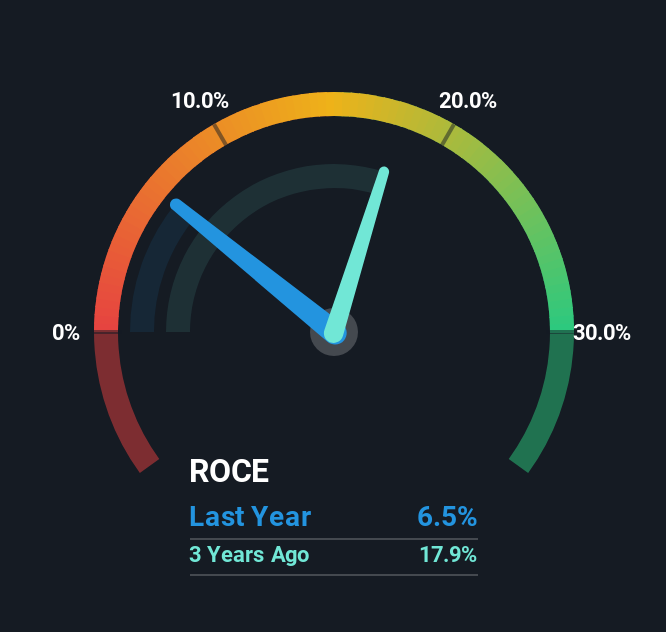Investors Met With Slowing Returns on Capital At DCW (NSE:DCW)
Finding a business that has the potential to grow substantially is not easy, but it is possible if we look at a few key financial metrics. In a perfect world, we'd like to see a company investing more capital into its business and ideally the returns earned from that capital are also increasing. Put simply, these types of businesses are compounding machines, meaning they are continually reinvesting their earnings at ever-higher rates of return. Having said that, from a first glance at DCW (NSE:DCW) we aren't jumping out of our chairs at how returns are trending, but let's have a deeper look.
Return On Capital Employed (ROCE): What Is It?
If you haven't worked with ROCE before, it measures the 'return' (pre-tax profit) a company generates from capital employed in its business. The formula for this calculation on DCW is:
Return on Capital Employed = Earnings Before Interest and Tax (EBIT) ÷ (Total Assets - Current Liabilities)
0.065 = ₹935m ÷ (₹22b - ₹7.3b) (Based on the trailing twelve months to March 2025).
Therefore, DCW has an ROCE of 6.5%. In absolute terms, that's a low return and it also under-performs the Chemicals industry average of 11%.
See our latest analysis for DCW

Historical performance is a great place to start when researching a stock so above you can see the gauge for DCW's ROCE against it's prior returns. If you'd like to look at how DCW has performed in the past in other metrics, you can view this free graph of DCW's past earnings, revenue and cash flow.
What Can We Tell From DCW's ROCE Trend?
Things have been pretty stable at DCW, with its capital employed and returns on that capital staying somewhat the same for the last five years. It's not uncommon to see this when looking at a mature and stable business that isn't re-investing its earnings because it has likely passed that phase of the business cycle. So unless we see a substantial change at DCW in terms of ROCE and additional investments being made, we wouldn't hold our breath on it being a multi-bagger.

Our Take On DCW's ROCE
In summary, DCW isn't compounding its earnings but is generating stable returns on the same amount of capital employed. Yet to long term shareholders the stock has gifted them an incredible 484% return in the last five years, so the market appears to be rosy about its future. But if the trajectory of these underlying trends continue, we think the likelihood of it being a multi-bagger from here isn't high.
If you're still interested in DCW it's worth checking out our FREE intrinsic value approximation for DCW to see if it's trading at an attractive price in other respects.
While DCW may not currently earn the highest returns, we've compiled a list of companies that currently earn more than 25% return on equity. Check out this free list here.
New: Manage All Your Stock Portfolios in One Place
We've created the ultimate portfolio companion for stock investors, and it's free.
• Connect an unlimited number of Portfolios and see your total in one currency
• Be alerted to new Warning Signs or Risks via email or mobile
• Track the Fair Value of your stocks
Have feedback on this article? Concerned about the content? Get in touch with us directly. Alternatively, email editorial-team (at) simplywallst.com.
This article by Simply Wall St is general in nature. We provide commentary based on historical data and analyst forecasts only using an unbiased methodology and our articles are not intended to be financial advice. It does not constitute a recommendation to buy or sell any stock, and does not take account of your objectives, or your financial situation. We aim to bring you long-term focused analysis driven by fundamental data. Note that our analysis may not factor in the latest price-sensitive company announcements or qualitative material. Simply Wall St has no position in any stocks mentioned.
About NSEI:DCW
DCW
Engages in the manufacture and sale of heavy chemical products in India.
Flawless balance sheet with solid track record.
Similar Companies
Market Insights
Community Narratives



